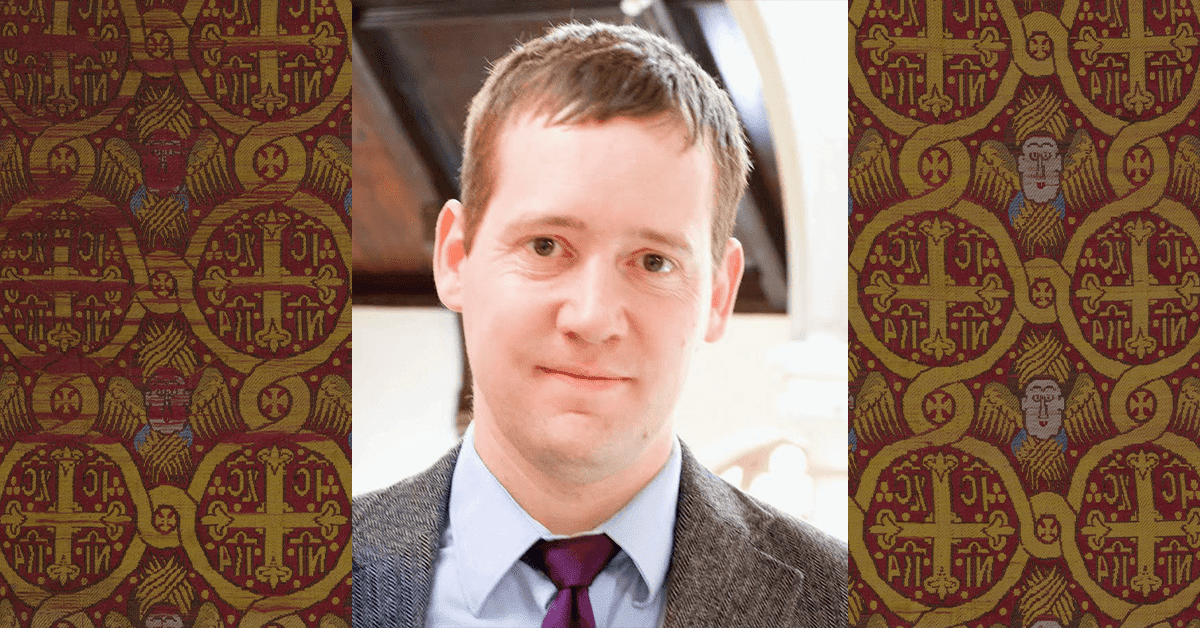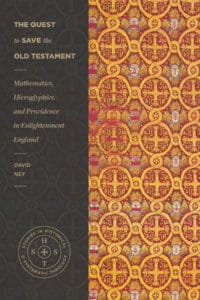
We are excited to publish three new volumes in the Studies in Historical and Systematic Theology (SHST) series this month. Today, we interview David Ney about his new book, The Quest to Save the Old Testament: Mathematics, Hieroglyphics, and Providence in Enlightenment England. Ephraim Radner calls this book “historical and theological writing at its best.”
Lexham Press: Would you briefly describe The Quest to Save the Old Testament?
David Ney: Over the past few years a steady chorus of voices within the church and academy have raised the alarm that the Old Testament has become something of a second class citizen within the Christian scriptural canon. Proposals for a re-invigorated Christian reading of the Old Testament have become commonplace, but what most of these proposals fail to note is that the acknowledged degradation of the Old Testament is a historical problem, which is to say that it is the result of specific historical and cultural forces. This is crucial to note because it entails that the reclaiming of the Old Testament is necessarily more than just a matter of adjusting exegetical method, important though this is. It is also a matter of the ways that we, as historically-embedded creatures, now perceive and understand the world in which we live. The study of early modern exegesis has confirmed, beyond question, that the degradation of the Old Testament is tied to shifts in western society which took place at the dawn of the eighteenth century, a century which is commonly called “the Enlightenment.” The Quest to Save the Old Testament is the story of the wrestlings of Enlightenment-era scholars who early identified the problem and sought to overcome it.
LP: Who is this book for and what do you hope readers take away from it?
Ney: As a piece of historical scholarship, the book is intended to fill some gaps in Enlightenment historiography. The Enlightenment has long been subject to what the great historian Herbert Butterfield famously called the “Whig” interpretation of history. This approach fits historical objects into an overarching conceptual narrative of causal and progressive development, and it is quite prepared to contort some historical objects it encounters and ignore others in a self-justifying way. Many have simply taken for granted that the story of the Enlightenment is the story of how biblical authority imploded with the arrival of modern, enlightened sensibilities. But the Bible was not the hapless victim of incipient secularizing forces. It was engagement with the Bible, at every turn, that generated cultural change.
As a piece of theological scholarship, the book is intended not merely for academics but for Christians at large. I hope that readers will come away from my book with a new appreciation of the power that the Old Testament has to shape our appreciation of God’s ways in the world. I argue that while the arrival of a version of Christianity which denigrated the Old Testament signaled the rise of what some are now calling “New Testament Christianity,” it also destabilized the historic Christian conviction that history is a work of God. And if the degradation of the Old Testament was behind this modern, secular point of view, the Old Testament stands in the way of all those who seek to overcome it.
LP: How is the retelling of Enlightenment-era treatment of the Old Testament relevant for today?
Ney: Textual interpretation is an extremely complex reality not merely because language is an extremely complex reality but because the assumptions we bring to texts, as interpreters, are multifarious. We all interpret texts and generate meaning as individuals, as members of interpreting communities and as members of society at large. This is just another way of saying what Gadamer emphasized, that each act of interpretation is itself a re-enactment of the text in question. Gadamer saw that each interpretive act is a historic act, with a history of its own. We can’t begin to hope to understand an act of interpretation, let alone evaluate it or overcome its deficiencies, if we haven’t attended to its place within this larger history. This all sounds theoretical, I know, but I am simply trying to make a plug for the discipline that sometimes goes by the name “the history of biblical interpretation.” As I’ve already emphasized, the problem of Old Testament degradation belongs to history. And as Winston Churchill was fond of saying (following George Santayana), those who do not know history are doomed to repeat it.
LP: What are some surprises the reader may encounter?
Ney: The Enlightenment has been subjected to selective research interests. Those who have seen modernity as the apex of human progress have tended to focus only on the people that easily conform to this narrative, just as those who decry modernity have their favorites too. When we care to look, however, we find all sorts of interesting people and conversations which cannot easily be conformed to such facile narratives (which is probably why they are so easily ignored!). In the Quest to Save the Old Testament readers will encounter (probably for the first time) individuals such as Samuel Clarke, John Hutchinson, and William Jones of Nayland, who were extremely influential in their own day, and well into the nineteenth century. They will also encounter those whom they have met before, though perhaps in a new and surprising way. At the top of the list here is the great Sir Isaac Newton who, while he has often been celebrated as the poster-boy of a secular modernity, was actually a devoted biblical scholar who brought many pre-modern sensibilities with him in his attempt to save the Old Testament.
The Quest to Save the Old Testament: Mathematics, Hieroglyphics, and Providence in Enlightenment England
Pastors and scholars today lament the Old Testament’s neglect in the West. But this is nothing new. In the eighteenth century, natural philosopher John Hutchinson witnessed the Old Testament becoming devalued as Scripture. And in his mind, the blame lay with Isaac Newton.
In The Quest to Save the Old Testament, David Ney traces the battle over Scripture during the Enlightenment period. For Hutchinson, critical scholarship’s enchantment with the naturalism of Newton undermined the study of the Old Testament. As cultural forces reshaped biblical interpretation, Hutchinson spawned a movement that sought, above all, to reclaim the Old Testament as Christian Scripture. Hutchinson’s followers sought to be shaped by Scripture, not culture. Rejecting the Newtonian degradation of history, they offered a compelling figural defense of the Old Testament’s doctrinal and moral significance. The Old Testament is the voice of Providence. It is the means of discerning God’s hand at work both in nature and in history.
The Quest to Save the Old Testament is a timely retelling of fateful and faithful attempts to “save” the Old Testament.








